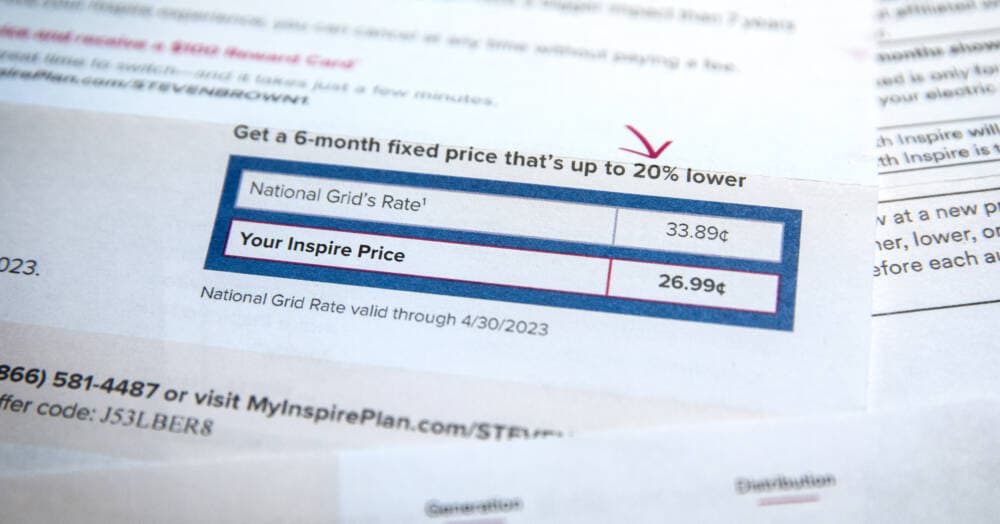Advertisement
Boston's Morning Newsletter
By the numbers: A look at competitive electric suppliers in Massachusetts

Editor's Note: This is an excerpt from WBUR's daily morning newsletter, WBUR Today. If you like what you read and want it in your inbox, sign up here.
Has someone ever knocked on your front door and offered a chance to save on your electric bill?
It was probably a competitive electric supplier salesperson.
And if the deal sounded too good to be true, that’s because it was.
As WBUR’s Miriam Wasser reports in the first installment of a three-part series on the competitive electric supply market, what started in the 1990s as an attempt to introduce lower prices into the utility sector through competition has largely led to the opposite.
The state attorney general’s office has found that these third-party companies deceptively offer lower rates but jack them up later — and seem to target those who can least afford it.
You can (and should) read Miriam’s excellently explained story here. But first, here’s a snapshot, by the numbers:
- 12: The number of states — including Massachusetts — that allow residents to buy electricity through competitive suppliers.
- 516,000: The number of Bay Staters enrolled in electric plans from competitive suppliers, or about one of every 14 residents.
- $525 million: The amount ratepayers in Massachusetts overspent on electricity between 2015 and 2021 because of competitive supply contracts.
- $231: How much the average Massachusetts resident enrolled with competitive suppliers loses per year, according to a report last week from Attorney General Andrea Campbell’s office.
- 29%: The percentage of low-income residents in the state that bought their electricity from a competitive supplier, compared to only 15% of non-low-income residents.
- 33%: The percentage of households in Brockton that are signed up for competitive electricity suppliers. It’s the highest rate in the state.
- 0: The number of competitive electricity supply companies that have actually charged customers less than a utility over a multi-year period.
- What should you do? Here’s a list of tips to help you avoid getting scammed and make informed decisions about your electric bill.
Advertisement
K-12 students in Marlborough may need to find a different way to school this morning. While two neighboring MetroWest communities narrowly avoided school bus strikes today after the drivers union’s contract expired, officials say the strike is on in Marlborough.
- City officials are referring parents to a contingency plan that directs students within 1.5 miles of their school to walk and offers a small number of buses to those living farther away.
- In Westborough, contract negotiations are still ongoing but officials say there’s no strike at this point.
- In Framingham, there’s no strike; a tentative deal was reached.
A PSA for commuter rail riders: Buses will be the only option today for late-night train riders from Braintree and beyond. Not only is the MBTA replacing Red Line service between JFK/UMass and Braintree with shuttles buses starting at 8:45 p.m. each night through Thursday, all three commuter rail lines to Braintree will stop service at 7:30 p.m. for the rest of the month to allow for the overnight track work. (That means the last train from South Station will leave a little after 7 p.m.)
- The Red Line diversion is the first of four early Braintree branch closures this month. (Three others are planned May 15-19, May 22-25 and May 30-31.) But the evening commuter rail diversion — announced last week — will run nearly every night through June 1.
- T officials say the dual diversions are for “critical” track work on the Red Line — which includes replacing nearly a mile of rail — to “alleviate speed restrictions” that currently cover 22% of the line.
- How slow is it? Between JFK/UMass and Braintree, the slow zones have made what was once a 20-minute trip take around 35 minutes in each direction, according to TransitMatters.
Meanwhile, it’s full speed ahead for Massachusetts fishermen. The state’s Division of Marine Fisheries says that right whales have continued their migration out of Massachusetts waters, meaning fishing restrictions to protect the endangered species can be lifted.
- Beginning today, fishing boats can return to normal speeds and resume using traps for the first time in three months.
P.S.— The countdown to Mother’s Day is under a week. If you want to save yourself some time finding a gift while also supporting the news you rely on, consider sending some Winston Flowers through WBUR. You can choose from four beautiful options and save 10% when you order today. It’s a win-win-win! (The third win is Mom, of course.)
